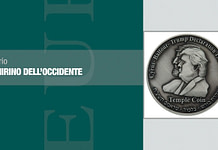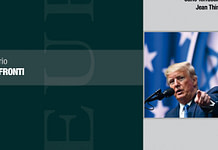Fabio Falchi, contributor of the review “Eurasia. Rivista di Studi Geopolitici” has been interviewed by Manuel Ochsenreiter about the political movement “5 stars”, which has won 22.55% of the votes in the last Italian general elections. Here the English translation of the interview, which has been published in the last issue of the German magazine “Zuerst!” (4/2013) under the title “Radikal anders”.
Mr. Falchi, the German social democrat candidate for the chancellors position, Peer Steinbrück, called Silvio Berlusconi and Beppe Grillo “clowns”. Let´s talk about Grillo – is he really a “clown”?
Beppe Grillo, is a comedian and blogger involved in politics since 2009. In a few years he has built up a new movement, “MoVimento 5 Stelle” ,from nothing, exploiting in an intelligent way the potential of Internet (the candidates of “MoVimento 5 Stelle” were chosen by party members through an online primary), but also conquering the squares, which traditionally belonged to the political left (on 22 February 2013, a large crowd of people attended the last meeting of Beppe Grillo in Piazza San Giovanni, in Rome). “MoVimento 5 Stelle” is composed of simple citizens joined together by hatred for the corruption and poor governance of the traditional parties. So, at the general election, last February, the civic “MoVimento 5 Stelle” won 25.55% of the vote for the Chamber of Deputies (and 23.79% of the vote for the Senate). Now it is the first party (even if it is not the first coalition) in the Chamber of Deputies. Apart from any other consideration, it is evident that Grillo is a clever politician, not a “clown”, and there is nothing to laugh about the success of “MoVimento 5 Stelle”.
German mainstream media sees in Beppe Grillo a “danger for the EU”, because he refuses the European currency. Is that right?
We do not know exactly what Grillo and “MoVimento 5 Stelle” think about “european currency” but we know that they think that european currency is not the solution of the “Eu problem” but it is “part” of this problem. We know that the danger of “Eu” is “Eu”, because “Eu” cannot or does not want to combat the dominance of financial markets. It seems that Grillo wants a referendum on the European currency, but a referendun cannot abolish an international treaty. Of course, it is important that Grillo clarifies as soon as possible his ideas about this problem, that, in the first place, is a (geo)political problem, not a mere economic problem – and we must remember that many european countries, members of “Eu”, have not European currency; in any case, there are “technical solution”, such as two euros (“northern euro” and “southern euro”, on the basis of a solidarity pact), or back to the “European snake”, or a real political and monetary “Eu” changing the role of the European Central Bank (that seems longa manus of financial markets in Europe) ad so on. The question is that “this Eu” cannot survive, Grillo or not Grillo. And many observers think that “Italy ship”, rebus sic stantibus, is expected to arrive in Piraeus! We must take into account the failure of “austerity” to understand the “phenomenon Grillo”.
What can you say about the MoVimento 5 Stelle? Is it a movement of the political right or left? Is it a real opposition party?
“MoVimento 5 Stelle” is neither moviment of political rigth nor left. Moreover, now political right and political left are two sides of the same coin.There are differences, but these differences are not very important. But, even if it is not fascist, or better neo-fascist moviment, it is true that Grillo has not not specific ideological roots and many observers consider “MoVimento 5 Stelle” as a demagogue and “populist” movement. Nevertheless, Grillo and his many supporters protest against financial speculation, the installation of Nato military bases and Italian military missions abroad. And Grillo had the courage to criticize Israel and defend the reasons of Iran. So, only if these political positions are the basis for the policy of the “MoVimento 5 Stelle” , this new moviment will be a real opposition party.
Will Grillo have influence on politics in Italy in future? Do you rate that positive or negative – and why?
“MoVimento 5 Stelle” is likely to deflate quickly, if it does not “grow” from political point of view. Criticizing the ruling class is different from being a ruling class. As you know, there are also many “doubts” about Gianroberto Casaleggio, co-founder of “MoVimento 5 Stelle”, of which he is called “guru”. In the next few weeks or in the next few months these doubts will disappear. However, considering the Italian situation and that all other comparable parties are blackmailed by the financial markets it is positive this “caos”. And we know that financial markets “speak English”. It is no coincidence tha United States want an economic Nato to strengthen relationship between the United States and Europe. Indeed, this would be the death of Europe. But we cannot prevent it with the actual (Italian and European, with few execeptions) ruling class. In this perspective, in my opinion, “MoVimento 5 Stelle” is not so much important. But “if” a new political movement should get out from this “caos”, a political force able to counter financial markets and the aberrant power politics of United States, then we could say that the success of “MoVimento 5 Stelle” is “not negative”. From a realistic point of view it is unlikely that “MoVimento 5 Stelle” can be such a political force (that seems very far from “Eurasian weltanschauung” and Grillo unfortunately does not seem to be an “Italian Chavez”) . But, it is not impossible that “something” hinders “euro-atlanticst mincer”. In effect, also in other european countries are growing so called “populist” (but not neo-fascist) movements. Also they have not a clear political theory (yet), but they seem to place at the center of the political debate people’s problems and that it is absurd that a State depends on the financial markets. Therefore, we should be “pragmatic” about all these movements. In this case, it is fair to say, without being vulgar, that the end could justify the means.
Questo articolo è coperto da ©Copyright, per cui ne è vietata la riproduzione parziale o integrale. Per maggiori informazioni sull'informativa in relazione al diritto d'autore del sito visita Questa pagina.




















